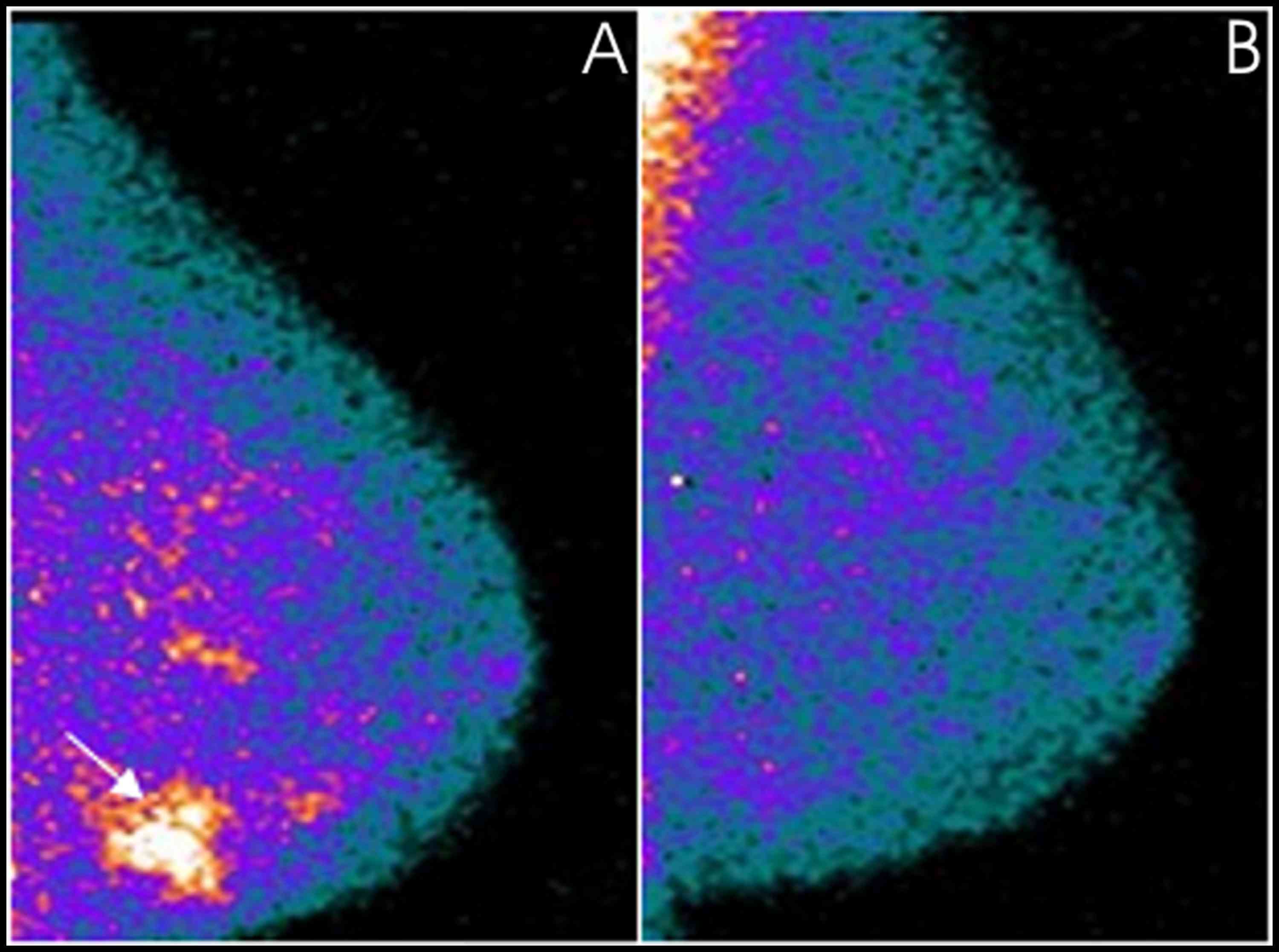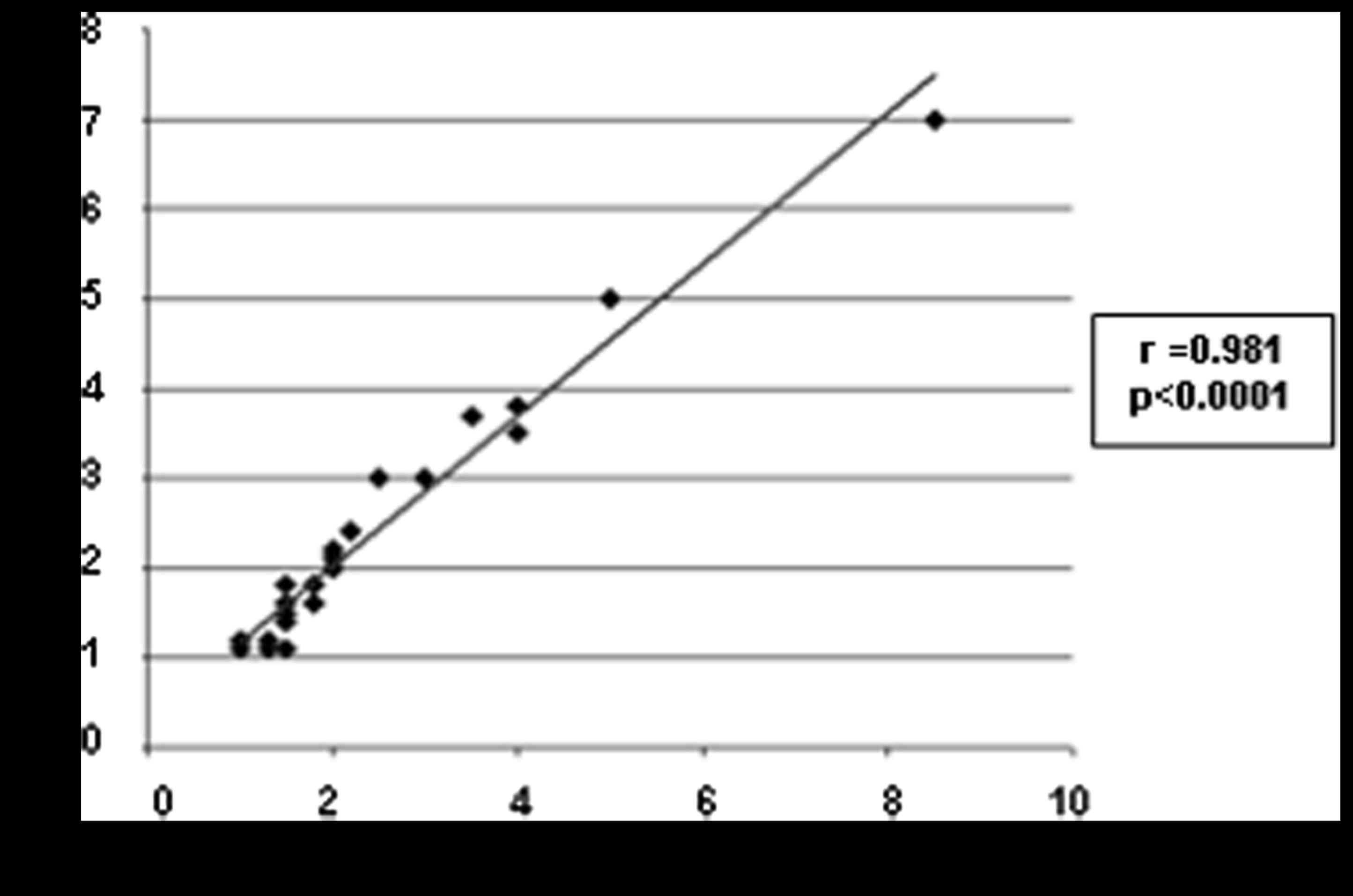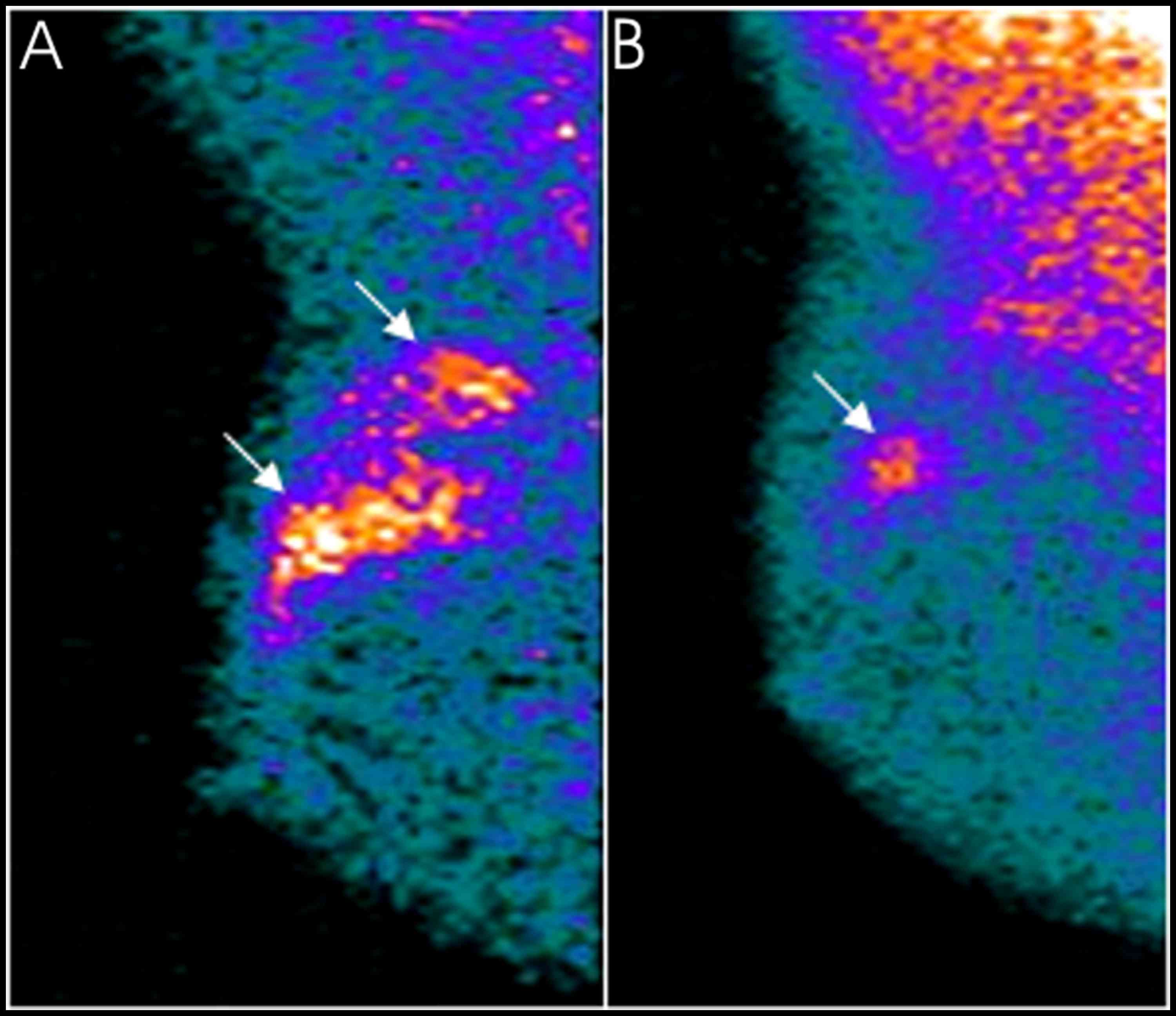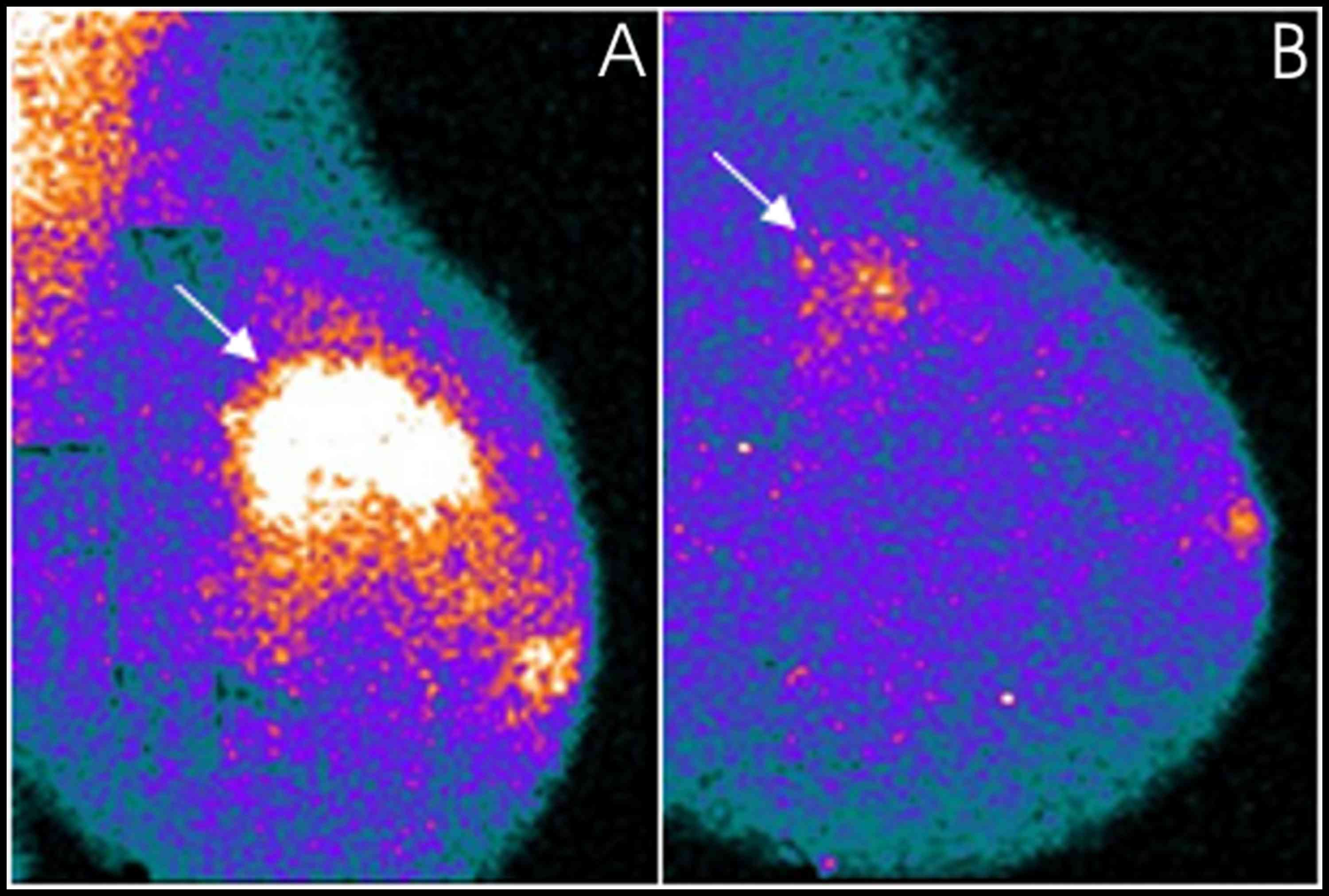|
1
|
Untch M, Konecny GE, Paepke S and von
Minckwitz G: Current and future role of neoadjuvant therapy for
breast cancer. Breast. 23:526–537. 2014. View Article : Google Scholar : PubMed/NCBI
|
|
2
|
Newman LA: Management of patients with
locally advanced breast cancer. Curr Oncol Rep. 6:53–61. 2004.
View Article : Google Scholar : PubMed/NCBI
|
|
3
|
Kong X, Moran MS, Zhang N, Haffty B and
Yang Q: Meta-analysis confirms achieving pathological complete
response after neoadjuvant chemotherapy predicts favourable
prognosis for breast cancer patients. Eur J Cancer. 47:2084–2090.
2011. View Article : Google Scholar : PubMed/NCBI
|
|
4
|
Chagpar AB, Middleton LP, Sahin AA,
Dempsey P, Buzdar AU, Mirza AN, Ames FC, Babiera GV, Feig BW, Hunt
KK, et al: Accuracy of physical examination, ultrasonography, and
mammography in predicting residual pathologic tumor size in
patients treated with neoadjuvant chemotherapy. Ann Surg.
243:257–264. 2006. View Article : Google Scholar : PubMed/NCBI
|
|
5
|
Spanu A, Farris A, Schillaci O, Chessa F,
Solinas ME, Falchi A and Madeddu G, Nuvoli S and Madeddu G: The
usefulness of 99mTc tetrofosmin scintigraphy in patients
with breast cancer recurrences. Nucl Med Commun. 24:145–154. 2003.
View Article : Google Scholar : PubMed/NCBI
|
|
6
|
Spanu A, Schillaci O and Madeddu G:
99mTc labelled cationic lipophilic complexes in
malignant and benign tumors: The role of SPET and pinhole-SPET in
breast cancer, differentiated thyroid carcinoma and
hyperparathyroidism. Q J Nucl Med Mol Imaging. 49:145–169.
2005.PubMed/NCBI
|
|
7
|
Schillaci O, Spanu A, Danieli R and
Madeddu G: Molecular breast imaging with gamma emitters. Q J Nucl
Med Mol Imaging. 57:340–351. 2013.PubMed/NCBI
|
|
8
|
Arbab AS, Koizumi K, Toyama K, Arai T and
Araki T: Ion transport systems in the uptake of
99Tcm-tetrofosmin, 99Tcm-MIBI and 201Tl in a
tumour cell line. Nucl Med Commun. 18:235–240. 1997. View Article : Google Scholar : PubMed/NCBI
|
|
9
|
Bernard BF, Krenning EP, Breeman WA,
Ensing G, Benjamins H, Bakker WH, Visser TJ and de Jong M:
99mTc-MIBI, 99mTc-tetrofosmin and
99mTc-Q12 in vitro and in vivo. Nucl Med Biol.
25:233–240. 1998. View Article : Google Scholar : PubMed/NCBI
|
|
10
|
Arbab AS, Koizumi K, Toyama K, Arai T and
Araki T: Technetium-99m-tetrofosmin, technetium-99m-MIBI and
thallium-201 uptake in rat myocardial cells. J Nucl Med.
39:266–271. 1998.PubMed/NCBI
|
|
11
|
Spanu A, Dettori G, Nuvoli S, Porcu A,
Falchi A, Cottu P, Solinas ME, Scanu AM, Chessa F and Madeddu G:
(99)mTc-tetrofosmin SPET in the detection of both primary breast
cancer and axillary lymph node metastasis. Eur J Nucl Med.
28:1781–1794. 2001. View Article : Google Scholar : PubMed/NCBI
|
|
12
|
Spanu A, Schillaci O, Meloni GB, Porcu A,
Cottu P, Nuvoli S, Falchi A, Chessa F, Solinas ME and Madeddu G:
The usefulness of 99mTc-tetrofosmin SPECT
scintimammography in the detection of small size primary breast
carcinomas. Int J Oncol. 21:831–840. 2002.PubMed/NCBI
|
|
13
|
Goldsmith SJ, Parsons W, Guiberteau MJ,
Stern LH, Lanzkowsky L, Weigert J, Heston TF, Jones E, Buscombe J
and Stabin MG: Society of Nuclear Medicine: SNM practice guideline
for breast scintigraphy with breast-specific gamma-cameras 1.0. J
Nucl Med Technol. 38:219–224. 2010. View Article : Google Scholar : PubMed/NCBI
|
|
14
|
Brem RF, Schoonjans JM, Kieper DA,
Majewski S, Goodman S and Civelek C: High-resolution
scintimammography: A pilot study. J Nucl Med. 43:909–915.
2002.PubMed/NCBI
|
|
15
|
Spanu A, Cottu P, Manca A, Chessa F, Sanna
D and Madeddu G: Scintimammography with dedicated breast camera in
unifocal and multifocal/multicentric primary breast cancer
detection: A comparative study with SPECT. Int J Oncol. 31:369–377.
2007.PubMed/NCBI
|
|
16
|
Spanu A, Chessa F, Meloni GB, Sanna D,
Cottu P, Manca A, Nuvoli S and Madeddu G: The role of planar
scintimammography with high-resolution dedicated breast camera in
the diagnosis of primary breast cancer. Clin Nucl Med. 33:739–742.
2008. View Article : Google Scholar : PubMed/NCBI
|
|
17
|
Spanu A, Sanna D, Chessa F, Manca A, Cottu
P, Fancellu A, Nuvoli S and Madeddu G: The clinical impact of
breast scintigraphy acquired with a breast specific γ-camera (BSGC)
in the diagnosis of breast cancer: Incremental value versus
mammography. Int J Oncol. 41:483–489. 2012. View Article : Google Scholar : PubMed/NCBI
|
|
18
|
Sun Y, Wei W, Yang HW and Liu JL: Clinical
usefulness of breast-specific gamma imaging as an adjunct modality
to mammography for diagnosis of breast cancer: A systemic review
and meta-analysis. Eur J Nucl Med Mol Imaging. 40:450–463. 2013.
View Article : Google Scholar : PubMed/NCBI
|
|
19
|
Spanu A, Sanna D, Chessa F, Cottu P, Manca
A and Madeddu G: Breast scintigraphy with breast-specific γ-camera
in the detection of ductal carcinoma in situ: A correlation with
mammography and histologic subtype. J Nucl Med. 53:1528–1533. 2012.
View Article : Google Scholar : PubMed/NCBI
|
|
20
|
Edwards C, Williams S, McSwain AP, Damle
S, Rapelyea JA, Downs K, Torrente J, Sambamurty A, Brem RF and Teal
CB: Breast-specific gamma imaging influences surgical management in
patients with breast cancer. Breast J. 19:512–519. 2013.PubMed/NCBI
|
|
21
|
Rhodes DJ, Hruska CB, Conners AL,
Tortorelli CL, Maxwell RW, Jones KN, Toledano AY and O'Connor MK:
Journal club: Molecular breast imaging at reduced radiation dose
for supplemental screening in mammographically dense breasts. AJR
Am J Roentgenol. 204:241–251. 2015. View Article : Google Scholar : PubMed/NCBI
|
|
22
|
Hsu DF, Freese DL and Levin CS:
Breast-Dedicated Radionuclide Imaging Systems. J Nucl Med. 57 Suppl
1:40S–45S. 2016. View Article : Google Scholar : PubMed/NCBI
|
|
23
|
Hruska CB, Phillips SW, Whaley DH, Rhodes
DJ and O'Connor MK: Molecular breast imaging: Use of a dual-head
dedicated gamma camera to detect small breast tumors. AJR Am J
Roentgenol. 191:1805–1815. 2008. View Article : Google Scholar : PubMed/NCBI
|
|
24
|
Hruska CB, Weinmann AL, Skjerseth Tello
CM, Wagenaar EM, Conners AL, Tortorelli CL, Maxwell RW, Rhodes DJ
and O'Connor MK: Proof of concept for low-dose molecular breast
imaging with a dual-head CZT gamma camera. Part II. Evaluation in
patients. Med Phys. 39:3476–3483. 2012. View Article : Google Scholar : PubMed/NCBI
|
|
25
|
Wahner-Roedler DL, Boughey JC, Hruska CB,
Chen B, Rhodes DJ, Tortorelli CL, Maxwell RW, Cha SS and O'Connor
MK: The use of molecular breast imaging to assess response in women
undergoing neoadjuvant therapy for breast cancer: A pilot study.
Clin Nucl Med. 37:344–350. 2012. View Article : Google Scholar : PubMed/NCBI
|
|
26
|
Lee HS, Ko BS, Ahn SH, Son BH, Lee JW, Kim
HJ, Yu JH, Kim SB, Jung KH, Ahn JH, et al: Diagnostic performance
of breast-specific gamma imaging in the assessment of residual
tumor after neoadjuvant chemotherapy in breast cancer patients.
Breast Cancer Res Treat. 145:91–100. 2014. View Article : Google Scholar : PubMed/NCBI
|
|
27
|
Menes TS, Golan O, Vainer G, Lerman H,
Schneebaum S, Klausner J and Even-Sapir E: Assessment of residual
disease with molecular breast imaging in patients undergoing
neoadjuvant therapy: Association with molecular subtypes. Clin
Breast Cancer. 16:389–395. 2016. View Article : Google Scholar : PubMed/NCBI
|
|
28
|
Spanu A, Ginesu F, Pirina P, Solinas ME,
Schillaci O, Farris A, Chessa F, Madeddu G, Marongiu P, Falchi A,
et al: The usefulness of 99mTc-tetrofosmin SPECT in the
detection of intrathoracic malignant lesions. Int J Oncol.
22:639–649. 2003.PubMed/NCBI
|
|
29
|
Schillaci O, Spanu A and Madeddu G:
[99mTc]sestamibi and [99mTc]tetrofosmin in
oncology: SPET and fusion imaging in lung cancer, malignant
lymphomas and brain tumors. Q J Nucl Med Mol Imaging. 49:133–144.
2005.PubMed/NCBI
|
|
30
|
Spanu A, Sanna D, Chessa F, Farris A,
Nuvoli S and Madeddu G: The usefulness of Tc-99m-tetrofosmin
SPECT/CT in the detection of residual tumors and axillary lymph
node metastases in breast cancer patients following neoadjuvant
therapy. Clin Nucl Med. 36:997–1002. 2011. View Article : Google Scholar : PubMed/NCBI
|
|
31
|
Spanu A, Farris A, Chessa F, Sanna D,
Pittalis M, Manca A and Madeddu G: Planar scintimammography and
SPECT in neoadjuvant chemo or hormonotherapy response evaluation in
locally advanced primary breast cancer. Int J Oncol. 32:1275–1283.
2008.PubMed/NCBI
|
|
32
|
Mitchell D, Hruska CB, Boughey JC,
Wahner-Roedler DL, Jones KN, Tortorelli C, Conners AL and O'Connor
MK: 99mTc-sestamibi using a direct conversion molecular
breast imaging system to assess tumor response to neoadjuvant
chemotherapy in women with locally advanced breast cancer. Clin
Nucl Med. 38:949–956. 2013. View Article : Google Scholar : PubMed/NCBI
|
|
33
|
Schillaci O, Scopinaro F, Spanu A,
Donnetti M, Danieli R, Di Luzio E, Madeddu G and David V: Detection
of axillary lymph node metastases in breast cancer with Tc-99m
tetrofosmin scintigraphy. Int J Oncol. 20:483–487. 2002.PubMed/NCBI
|
|
34
|
Spanu A, Tanda F, Dettori G, Manca A,
Chessa F, Porcu A, Falchi A, Nuvoli S and Madeddu G: The role of
(99m)Tc-tetrofosmin pinhole-SPECT in breast cancer non palpable
axillary lymph node metastases detection. Q J Nucl Med. 47:116–128.
2003.PubMed/NCBI
|
|
35
|
Madeddu G and Spanu A: Use of tomographic
nuclear medicine procedures, SPECT and pinhole SPECT, with cationic
lipophilic radiotracers for the evaluation of axillary lymph node
status in breast cancer patients. Eur J Nucl Med Mol Imaging. 31
Suppl 1:S23–S34. 2004. View Article : Google Scholar : PubMed/NCBI
|
|
36
|
Spanu A, Chessa F, Sanna D, Cottu P, Manca
A, Nuvoli S and Madeddu G: Breast cancer axillary lymph node
metastasis detection by a high-resolution dedicated breast camera:
A comparative study with SPECT and pinhole SPECT. Cancer Biother
Radiopharm. 22:799–811. 2007. View Article : Google Scholar : PubMed/NCBI
|
|
37
|
Spanu A, Chessa F, Sanna D, Cottu P, Manca
A, Nuvoli S and Madeddu G: Scintimammography with a high resolution
dedicated breast camera in comparison with SPECT/CT in primary
breast cancer detection. Q J Nucl Med Mol Imaging. 53:271–280.
2009.PubMed/NCBI
|


















